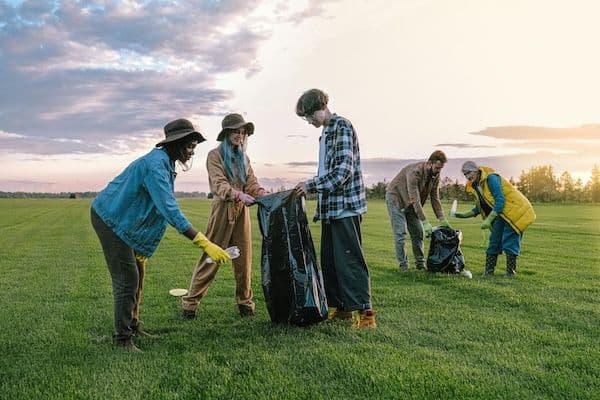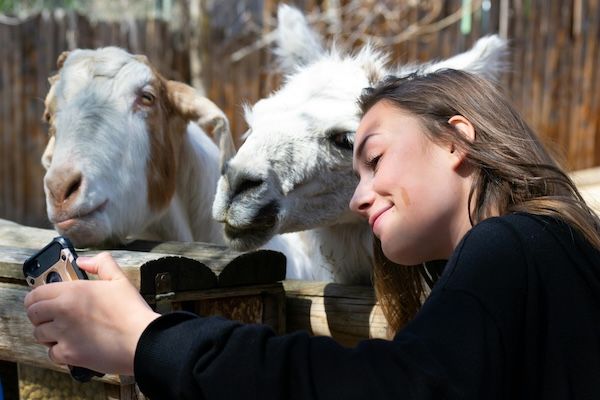
Choosing a Summer Volunteer Program for High School Students
Summer volunteer programs for high schoolers can provide excellent opportunities to develop leadership, community service skills, and a stronger application narrative. This blog serves as a guide to helping determine what to look for in a service or volunteer opportunity, as well as listing out several organizations to consider nationally and internationally, with a special focus on local programs in NYC and Atlanta.

Photo by Anna Shvets
Summer volunteer programs for high schoolers can provide excellent opportunities to develop leadership, community service skills, and a stronger application narrative. There are many programs, both locally and nationally, that provide tangible benefit to their communities and seek volunteers of all ages. Finding the right program to volunteer at is about balancing your interests and the availability/need at organizations. This article serves as a guide to helping determine what to look for in a service or volunteer opportunity, as well as listing out several organizations to consider nationally and internationally, with a special focus on local programs in NYC and Atlanta.

Photo by RDNE Stock project
Why volunteer over the summer?
Volunteering can be a great way to gain experience in an area of interest to you while serving others and boosting your college resume. The benefits of volunteering in high school include:
- Skill Development and Character Building. Summer volunteer programs foster personal growth by helping students develop essential life skills such as teamwork, leadership, problem-solving, and empathy. These qualities are valued in both college admissions and professional environments.
- Demonstrating Commitment to Values. Participation in volunteer work reflects dedication to causes beyond academics, showcasing a student’s alignment with values like community service, environmental awareness, or social equity. This aligns with the ethos of the application narrative, as colleges value candidates who are well-rounded and engaged citizens.
- Enhancing Academic and Professional Goals. Volunteer programs tied to a student's prospective major (e.g., environmental cleanup projects for students interested in biology or sustainability) reinforce their academic narrative, demonstrating depth of investigation and proactive engagement.
- Opportunities for Localized Impact and Research. Students can use local volunteer opportunities to investigate and address community-specific challenges. For example, volunteering at a community health clinic might inspire research into healthcare disparities, creating a thematic foundation for their college applications.
How can volunteering impact your college admissions?
Volunteering, like most extracurricular activities, is not enough to earn you a spot at a college or university. But a judicious selection of a program/organization can help your overall college application narrative. Here’s how to choose a volunteer opportunity with college admissions in mind.
- Align with Your Prospective Major. Choose a program that relates to your intended field of study. For example, students aiming for medical school might volunteer at hospitals or health camps, while future engineers might engage in robotics workshops for underprivileged youth. If you do not have a prospective major in mind yet, this is an important first step, and you may want to speak to one of our college counselors to develop a strategy.
- Prioritize Local or Unique Contexts. Focus on programs that allow for local impact or emphasize personal connections to the cause. Localized engagement signals authenticity and a commitment to the community, which resonates strongly with admissions committees.
- Look for Leadership and Opportunities for Deliverables. Programs that offer leadership roles or allow you to produce tangible deliverables (e.g., organizing events, creating reports, or publishing findings) can serve as evidence of your initiative and capability.
- Assess Program Quality and Relevance. Avoid generic or overly crowded programs. Instead, select opportunities where you can make a meaningful contribution and stand out. Competitive programs or those linked to a professional mentor can provide depth to your engagement.
- Ensure It Ties into Your Narrative. The volunteer experience should enhance your application narrative. For instance, if your ethos emphasizes problem-solving through innovation, a program that lets you design solutions for real-world challenges would reinforce this narrative.
By strategically selecting and engaging in summer volunteer opportunities, students can enhance their college applications while gaining valuable personal and academic experiences.
Additional Volunteering Considerations
There are a few other considerations when choosing a volunteer opportunity.
- Time commitment. How long are you looking to volunteer for? Can you commit 40 hours a week for your whole summer? Are you looking for a two-week commitment? One day a week? Determining how much time you are willing and able to spend volunteering determines what kind of program or opportunity you should look for.
- Global vs Local. Some students choose to volunteer through international organizations, giving them travel and language opportunities while doing service work. Others will look to local organizations or issues they are passionate about. You’ll need to consider what best fits your interests and long-term goals. A summer teaching English in Nicaragua is admirable, but consider how it plays into your education plans.
- Cost. If you choose a program over a local organization or cause, there will often be costs (administrative, housing, travel, etc.), especially if you’re moving somewhere for the summer to take part in the volunteer program.
- Your capabilities. Believe it or not, not all non-profits are desperate for any volunteer they can get their hands on. Many need volunteers with specific skill sets, such as accounting, non-English languages, or fundraising. When reaching out to local nonprofits, be sure to compare your skills and capabilities with their needs. If you do not meet their needs, do not be surprised if they never follow up with your inquiry. Instead, focus on places where your skills and interests match the organization, or choose to go through a program that matches high school students to opportunities.
Ultimately choosing the right volunteer program requires you to carefully assess the trade offs. What can you provide an organization or program and what can they provide you in return? Most colleges and universities no longer look at volunteering as evidence that you’re a “well-rounded student”; instead, they want to see that you took initiative in something that mattered to you or your community, and that aligns with your major and career interests.
12 Summer Volunteer Programs for High School Students
The programs listed below are well-respected programs that allow for student volunteers. Do not be limited by this list, though: follow your passions and look for opportunities in your neighborhood or community.
New York
New York Cares
Location: All five boroughs of New York City
Website: https://www.newyorkcares.org/home
Requirements: Students aged 14-17 will need a parent or guardian to create an account for them, but then can participate in programs marked “teen friendly” after completing a volunteer orientation.
A well-recognized name in NYC volunteerism, New York Cares is best known for its winter coat drive, but offers a wide range of volunteer opportunities, including tutoring, community clean-ups, and assisting at local food pantries. It’s ideal for students looking to engage in diverse, community-oriented projects.

Photo by Zeeshaan Shabbir
NYC Parks GreenThumb Program
Location: All five boroughs of New York City
Website: https://www.nycgovparks.org/opportunities/volunteer
Requirements: none specified; role dependent
With hundreds of opportunities, students can engage in urban gardening, park maintenance, and beautification projects. This is great for those passionate about environmental sustainability and community development. The Parks Department also offers internships.
New York Aquarium
Location: 602 Surf Ave, Brooklyn, NY 11224
Website: https://nyaquarium.com/volunteering/education-volunteers/discovery-guide-volunteer-program
Requirements: Be in high school or college and complete the application.
The New York Aquarium allows high school students to work as Discovery Guides, educating aquarium visitors about conservation and wildlife, while gaining experience in teaching, leadership, and public speaking. Learn more at the Aquariam’s FAQ page.
Atlanta

Photo by Brett Sayles
Zoo Atlanta Volunteen Program
Location: 800 Cherokee Avenue SE, Atlanta, GA 30315
Website: https://zooatlanta.org/program/volunteen-program/
Requirements: Year long commitment (June 1 - May 31). Ages 14-17 when starting the program and enrolled in high school for the upcoming school year (or equivalent). Must apply. Applications due Wednesday January 31, 2025 by 5:00 p.m. for the program year beginning June 1, 2025.
The Atlanta Zoo’s Volunteen Program is a well-respected program, but does require a significant time commitment (160 hours minimum over the course of the year). It offers hands-on experience with animal care, education, and conservation, making it perfect for students interested in zoology or environmental sciences.
Fernbank Youth Interpreters (FYI Program)
Location: 767 Clifton Road, Atlanta, GA 30307
Website: https://www.fernbankmuseum.org/support/volunteer/fyi-volunteers/
Requirements: Year long commitment (June 1 - May 31). Applications for the 2025-2026 program will be available in February.
This highly respected and highly competitive program is open to students ages 13-17 and allows students to participate directly in public events and education. It requires a minimum of 45 hours over the course of a year and is a valuable opportunity for those inclined toward STEM or education.
Hands on Atlanta
Location: across Atlanta, GA metro area
Website: https://www.handsonatlanta.org/volunteer
Requirements: varies by opportunity
Hands on Atlanta connects volunteers with non-profits and other service organizations, with three main focus areas: food insecurity, education, and environment. Students can narrow down opportunities by age requirement and interest, as well as by time availability. Choose from one-time engagements to on-going ones. This program provides the most variability and will allow students of all academic interests to find a good fit.
National
Luv Michael
Location: virtual
Website: https://luvmichael.com/volunteer/
Requirements: none specified
Originally a New York based program, Luv Michael launched its virtual volunteer program in 2020 to to inspire students to become advocates for autism acceptance. Volunteers learn about autism then spend their time advocating and educating others and working to create meaningful work and community for autistic adults. This is an excellent opportunity for students considering education, social work, or even occupational therapy.

Photo by Rodolfo Gaion
Habitat for Humanity Youth Programs
Location: various locales across the U.S.
Website: https://www.habitat.org/volunteer/near-you/youth-programs
Requirements: varies by program
Habitat for Humanity allows for volunteers as young as 5 years old. High school students can participate in building homes or working on community projects across the country. Habitat does not have a structured summer program, so you’ll want to investigate the needs of your local Habitat for Humanity, or an area where you can provide your own room and board. These opportunities are ideal for those interested in social justice or architecture.
Volunteer Match
Location: across the U.S.
Website: https://www.volunteermatch.org/
Requirements: varies by opportunity
This volunteer hub allows students to match with opportunities local to them. Filter by availability and age of volunteer. If you have specific skills, such as speaking a second language, you can also add that to your search. The extensive network makes it easy to find something of interest to any student.
International
Rustic Pathways
Location: across the Globe, including Fiji, Costa Rica, and Ecuador
Website: https://rusticpathways.com/students/programs
Requirements: varies by program; these are paid programs
Rustic Pathways offers many service based programs across the globe. Make sure to find the service programs when visiting the website, as some opportunities are purely learning/tourist opportunities. These programs are most advantageous for students interested in environmental sustainability, wildlife conservation, and community development.
Global Leadership Adventures
Location: across the Globe, including Ghana, South Africa, and Peru
Website: https://experiencegla.com/
Requirements: none specified; these are paid programs
A well-established name in voluntourism, GLA offers Spring Break and Summer programs for middle and high school students. You can choose your program by location or interest. Be aware some programs are tourist or language immersion only. If you’re looking to volunteer, make sure to choose a service-based program. Primary focus areas include education, healthcare, and leadership development.
Global Vision International (GVI)
Location: across the Globe, including Kenya, Seychelles, Cambodia, and Costa Rica
Website: https://www.gviusa.com/volunteer-opportunities-for-teens/
Requirements: varies by program, some require visas or additional vaccinations; these are paid programs
Global Vision International has two main focus areas: conservation and community development. Most teen programs take place over two weeks. Choose based on location or interest. The majority of opportunities for teens are conservation focused and involve 15-20 hours of hands-on field work.
More Volunteer Ideas
When looking to find the right volunteer opportunity to align with your future career goals, you’ll likely need to do a lot of research to find just the right fit. The programs above are a great place to start, but they’re not an all-inclusive list. When looking for something local, consider the following spaces and see what you find!
- Literacy organizations
- Soup kitchens or food equity organizations
- Local camps
- Dorot, eldercare, senior centers, etc.
- Animal shelters
- Get Out the Vote
- ACLU Institute
- Service trips run by local organizations
Conclusion
Thoughtfully choosing enrichment activities throughout high school can help you achieve your college and career goals. Volunteer opportunities, or service programs, can help you gain leadership experience and demonstrate initiative. Ivy Tutors Network’s college admissions coaches can help you find and decide on opportunities that will help your college application. And if a volunteer program doesn’t sound like the right fit for you, consider an independent research project through our research mentorship program.




